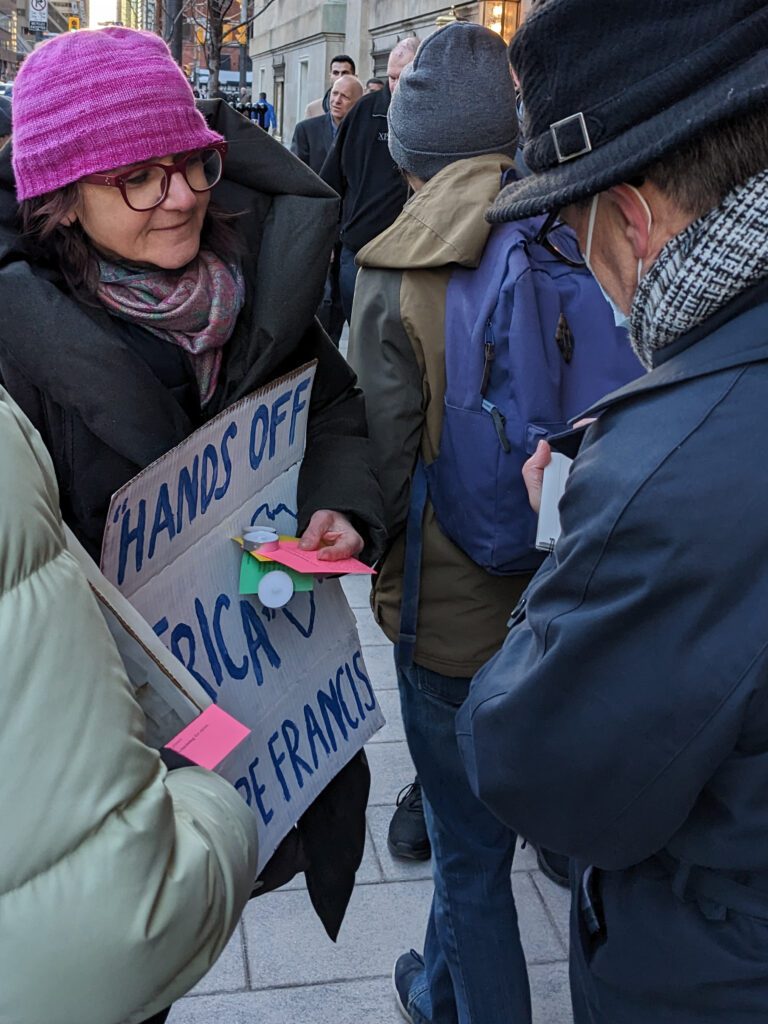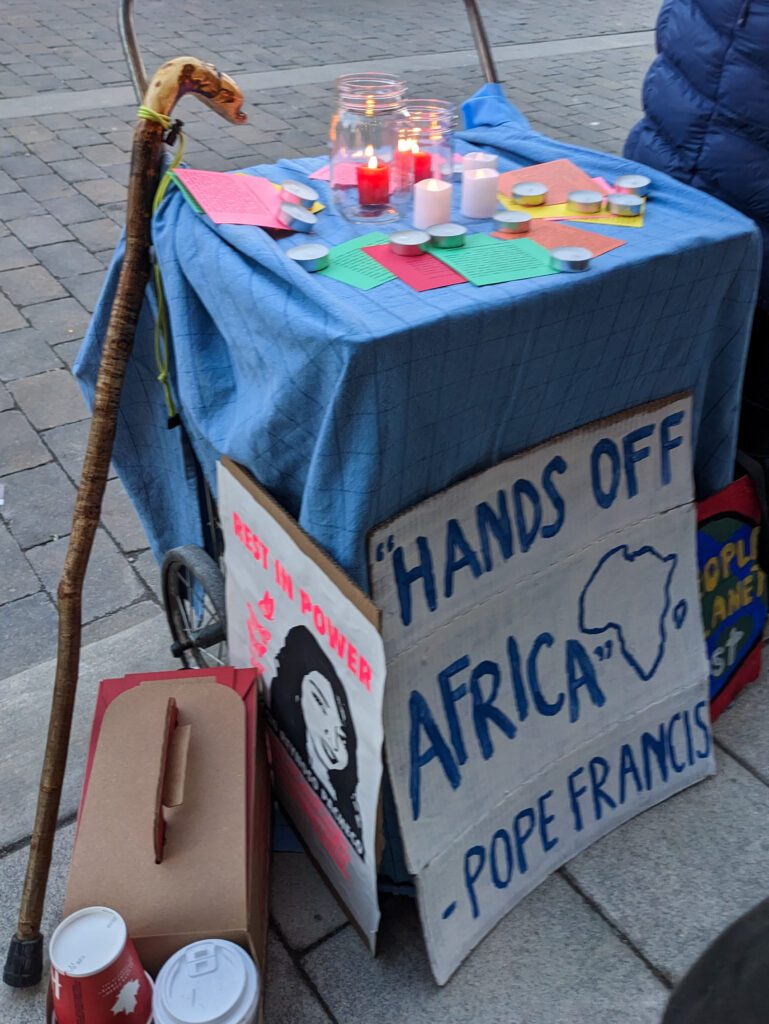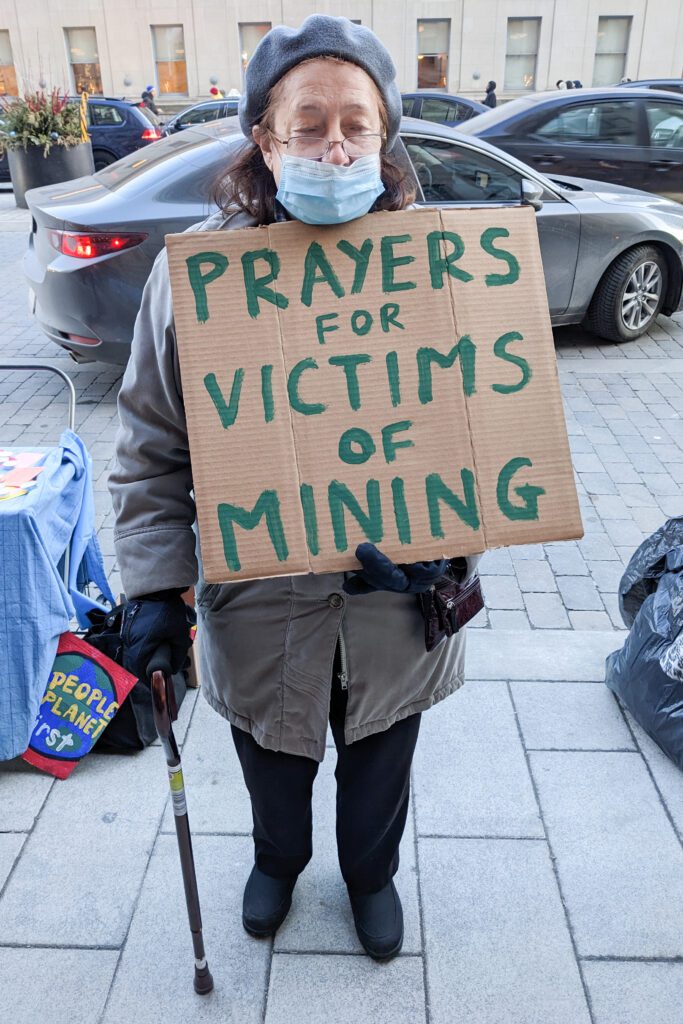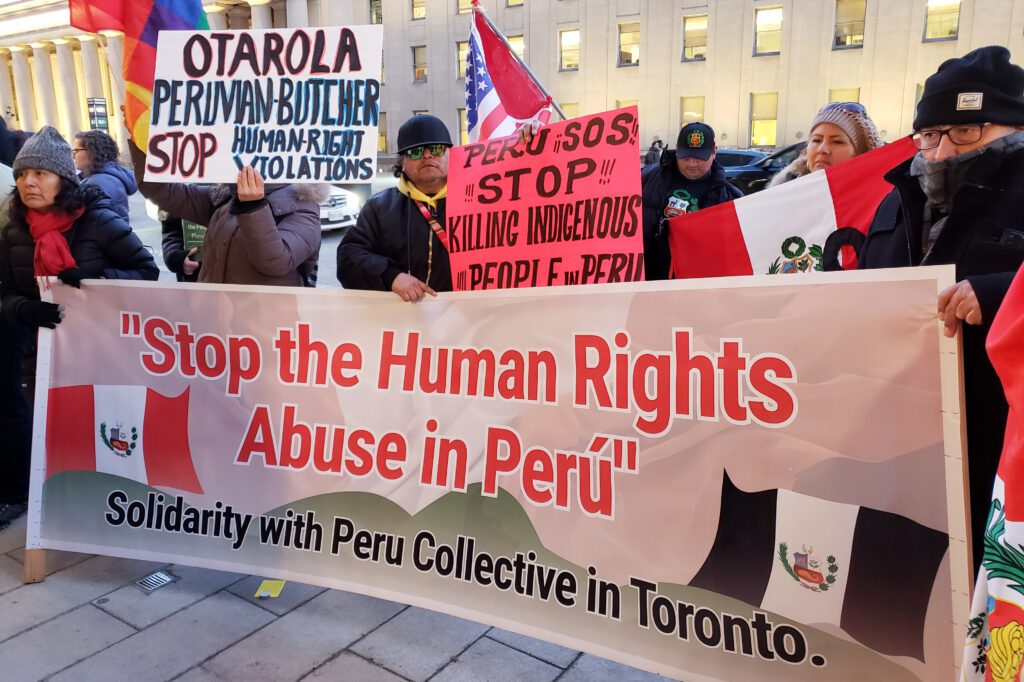By Dean Dettloff, Animator for Central Ontario








Toronto is a mining city.
The Toronto Stock Exchange lists some 40 per cent of the world’s publicly traded mining companies. Mining and mining finance companies’ offices, and mining-branded university buildings and programs dot the landscape. A premier academic institute, a critical healthcare facility and even a prominent public debate are named for Peter Munk, the late mining baron who founded Barrick Gold, the world’s biggest gold mining company and one with a long history of human rights and environmental abuses in the Global South. It’s difficult to walk around the city without being reminded that the industry has a large footprint here.
That’s one reason why the Prospectors and Developers Association of Canada (PDAC) hosts one of the world’s biggest mining conventions every year in Toronto. But the PDAC convention rarely goes uninterrupted.
Continuing its years of interventions, the Mining Injustice Solidarity Network (MISN) again picketed the PDAC’s 2022 convention to protest industry abuses. Development and Peace ― Caritas Canada joined KAIROS, the Student Christian Movement (SCM) and other Christians at the demonstration on June 13, 2022. Our members amplified a letter written by our Peruvian partner, the Comisión Episcopal de Acción Social, addressed to the PDAC, calling for due diligence regulations. As Christians in solidarity with people all over the world, we sought to be a prophetic voice in the mining conversation.
While we were proud to be present and to have connected our partner to the PDAC, I could not help but feel the need for a stronger showing by people of faith. That feeling was echoed among our members and friends in the ecumenical movement.
Over the next year, we worked with KAIROS and SCM to build an informed group and prepare it to act at the 2023 PDAC convention.
Unearthing Justice: a young adults’ reading group
If we were to hold the mining industry accountable, we thought, we had better know what we’re talking about. So, in January 2023, we began a young adults’ reading group focused on the book Unearthing Justice: How to Protect Your Community from the Mining Industry by Joan Kuyek, a founder of MiningWatch.
We learned about mining’s link to colonialism in Canada and the Global South, how the industry operates and how people have tried to confront it. We were pleasantly surprised to find that Development and Peace ― Caritas Canada and KAIROS were mentioned in the book, in the context of our campaign for an ombudsperson for corporate responsibility.
Reading Kuyek’s book, we felt more confident discussing mining. But what, we wondered, were people affected by it saying about the mining industry?
Hearing firsthand about mining abuses
To find out, we organized a webinar (watch recording) on February 16, 2023, that Kuyek graciously agreed to chair. People tuned in from across Canada to hear insights from three speakers: Fr. Dário Bossi, a Comboni missionary living in Brazil; Loretta Williams, an elected leader of the Xeni Gwet’in, one of six Tsilhqot’in communities in British Columbia; and Fr. Jacques Nzumbu, a Jesuit from the Democratic Republic of the Congo who is studying mining and green technology in Montreal. Despite the vast differences between their contexts, much of the panelists shared amounted to the same thing: the mining industry promises development, jobs and a better future, but usually brings ecological destruction, displacement and the breakup of community.
“We consider gold as a noble metal, but its extraction is full of violence,” said Fr. Bossi. He spoke about the destruction visited by mining on the Indigenous Yanomami people in the Amazon; a tailings (mining waste) dam collapse that killed 270 people, not all of whose families Vale Inc. had to compensate; and the resilience of communities remembering the victims of mining and organizing for justice.
Williams recounted the Tsilhqot’in Nation’s ongoing effort to keep Taseko Mines Ltd. off their territory so that the land and the salmon in its waterways are preserved. This has involved building a coalition of First Nations women, community members and experts. In the midst of their struggle, a tailings dam collapse in nearby Mount Polley poured billions of litres of mining waste into a major freshwater source and salmon habitat. “To this day, the Mount Polley mine is still draining effluent into that water system, into the Quesnel Lake, which is heartbreaking to us as First Nations people,” Williams said.
Fr. Nzumbu acknowledged the need for transitioning to green energy technologies but warned that extracting the cobalt and coltan they need is creating armed conflict and toxic working conditions in the Congo. “We are facing the huge impact of these kinds of minerals in our country,” he said, showing images of artisanal miners, including children, working knee-deep in muck. The minerals they find end up in products we buy in the Global North, but we never see their terrible human and ecological cost.
Prayerful prophetic presence at the PDAC
Inspired by this conversation and MISN’s organizing, we resolved to act at the PDAC convention in March 2023. What, we thought, could faith communities contribute uniquely this time? We resolved with KAIROS and SCM to bring a prayerful presence. The PDAC was to host an industry awards gala at the Fairmont Royal York hotel. That would be the perfect setting for a prophetic action. As the mining industry gathered to celebrate its achievements, we would gather to celebrate the lives of those affected by it.
To prepare our hearts, our Toronto diocesan council hosted an online vigil on the opening day of the convention. Members prayed, sang, and read the names of several victims of mining around the world, calling “Presente!” after each, following a tradition in the Global South that affirms the continued presence of the martyred in communal memory.
On Tuesday, March 7, around 40 protestors from ecumenical movements, diasporic communities and civil society organizations greeted PDAC awards gala invitees outside the hotel. We handed them coloured cards bearing a commemorative tealight candle, information about mining abuses and links to a web page for further reading. We also sang, prayed and listened to accounts from members of the Peruvian and Filipino communities of how mining affected their countries.
One of our members, Randy Haluza-Delay, reread the names from the virtual vigil, which again elicited a “Presente!” Holding placards with slogans that included Pope Francis’s famed “Hands off Africa!” statement, we formed a “guard of shame” that those going to celebrate mining had to pass by and be reminded that the victims of the industry are not forgotten.
Some convention-goers accepted our cards. Others walked by, eyes averted. Still others scoffed or mocked us. After all, invitees to an awards gala for one of the most violent industries were hardly likely to be receptive to reminders of violence. Yet, we left with a humble hope that at least a few may have had their conscience pricked or paused to consider the cost of their comfort.
Until next time
Mining is among the most dangerous industries for land defenders, vulnerable communities and delicate ecosystems. Our partners in the Global South consistently complain about how it threatens people and the planet. Wandering past Munk monuments and big banks in this mining city, I often wonder: What does it mean to be a Christian, in solidarity with people around the world, living in Toronto? What does the Gospel call me to do? How can we be effective megaphones for our partners who are resisting mining abuses each day?
These remain open questions for me. This year, almost 24,000 people attended the PDAC convention, including heads of state, executives and university students. Dwarfed by these numbers, our little vigil of 40 people still seemed to strike the occasional chord or a nerve! The convention will return next year. Heeding Pope Francis’s call to hear the cry of the earth and the cry of the poor, so will we, bearing our partners’ stories and the love for creation.
Our journey for mining justice continues in this mining city and beyond.

